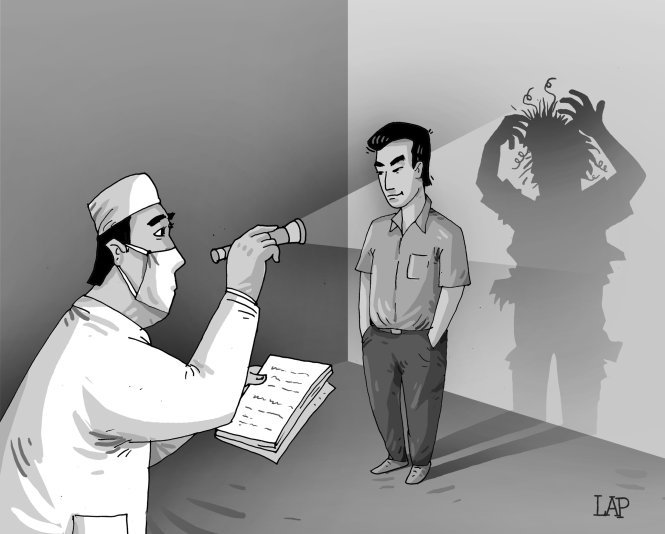Persons with mental illness who engage in behavior that violates the law, causing harm to the health, life, or property of others, pose a significant danger to society. So how does the law prescribe the handling of these individuals?
Mentally Ill Offenders: How to Handle? (Illustrative Image)
1. Current Regulations on Criminal Responsibility of Mentally Ill Offenders
Article 21 of the Criminal Code 2015 stipulates:
A person who commits a socially dangerous act during mental illness or another condition that causes loss of cognitive ability or ability to control their behavior shall not bear criminal responsibility.
Thus, current law stipulates that a person who commits a crime during mental illness or another condition that leads to loss of cognitive ability or ability to control their behavior will not bear criminal responsibility for the crime committed.
To accurately determine whether the person committing a socially dangerous act is mentally ill, the Criminal Procedure Code 2015 requires this to be one of the cases where forensic examination is mandatory (Clause 1, Article 206). If the examination results show that the person committed a socially dangerous act during mental illness, the Procedural Conducting Authority will rely on the examination results to commit them to a mandatory treatment facility without bearing criminal responsibility for the act committed.
However, under current law, mentally ill individuals who commit crimes can still bear criminal responsibility if the medical examination council concludes that they only have limited ability to act, not a total loss.
Furthermore, according to Article 21 of the current Criminal Code, mentally ill persons are only exempt from criminal responsibility for committing a socially dangerous act during their illness. If they commit a crime in a completely normal state but later fall into a state of loss of cognitive ability or ability to control their behavior before being sentenced, the court may, based on forensic and psychiatric examination conclusions, decide to commit them to a specialized treatment facility. After recovery, they may still bear criminal responsibility, as stipulated in Clause 2, Article 49 of the Criminal Code 2015.
Note: Although they may be exempt from criminal responsibility, mentally ill persons (through their legal representatives) still bear civil responsibility to compensate for damages to the victims' families.
2. Is there exploitation of legal regulations to evade crime?
Current law stipulates that the state of "non-competence, criminal responsibility" applies to a person who commits a genuinely socially dangerous act during mental illness or another condition that causes loss of cognitive ability or ability to control their behavior, thus exempting them from criminal responsibility. This is considered a "loophole" for offenders to, by some means, fabricate documents to legitimize "feigning mental illness" to evade justice.
It is a fact that, in many cases, offenders have exploited this legal loophole to evade crime. By "buying" forensic psychiatric examination conclusions from competent specialized agencies, they claim mental illness, thereby exempting themselves from criminal responsibility and only requiring treatment at a specialized medical facility. After a period of treatment, they "suddenly recover" and return home, living as if nothing had happened.
In this regard, current law also clearly stipulates the handling of professionals who falsify psychiatric examination documents. Article 382 of the current Criminal Code stipulates that any examiner who gives false conclusions or provides documents known to be false, leading to wrongful conviction of the innocent or allowing criminals to escape, may be imprisoned for 3-7 years, and banned from holding positions, practicing certain professions, or doing specific work for 1-5 years.
For documents checked and confirmed by assigned examiners or doctors, their fraudulent actions fall under the category of performing public duties. At this point, they exploit their positions and powers to commit unlawful acts. Article 359 of the Criminal Code 2015 stipulates that anyone who, for profit or other personal motives, exploits their position and power to: alter or falsify the content of documents; create or issue false documents; or forge signatures of authorized persons, may be imprisoned for 1-5 years; ... Creating or issuing 11 or more false documents may result in imprisonment for 12-20 years.
If the individual has received or promised to receive material or immaterial benefits for falsifying medical records, their actions may fall under the crime of Accepting Bribes as per Article 354 of the Criminal Code 2015, while the briber may be guilty of Giving Bribes as per Article 364 of the Criminal Code 2015. If no benefit can be proven, the person committing the crime may be considered guilty of Abuse of Power in Performance of Official Duties as per Article 356 of the Criminal Code 2015.
In reality, the boundary between determining mental illness or not is very fine. Therefore, it's crucial for investigative agencies to carefully and meticulously determine whether the individual was mentally ill or suffering from another condition causing a loss of cognitive ability or control when committing the crime.
Duc Thao
 Article table of contents
Article table of contents










